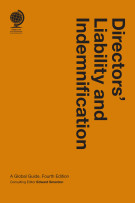Strategies for the oil and gas industry to cope in a low price environment
13 January 2017

Partner, Akin Gump Strauss Hauer & Feld

Author bio coming soon
Marc Hammerson, partner, and Nicholas Antonas, associate, in the global energy transactions group at Akin Gump and consulting editors to the second edition of Oil and Gas Decommissioning: Law, Policy and Comparative Practice, discuss the development in the regulation of the united kingdom continental shelf.
2016 REVIEW: DEVELOPMENTS IN THE REGULATION OF THE UNITED KINGDOM CONTINENTAL SHELF
Introduction
A significant development occurred in the UK’s oil & gas industry on 1 October 2016. The Oil & Gas Authority (OGA), the industry regulator, was converted from an executive agency of the government to a company with the Secretary of State for Business Energy and Industrial Strategy as its sole shareholder.
It marks the final step in the creation of an independent regulator. This change coincided with a number of OGA policy and strategy papers intended to promote efficient operating standards in the UK continental shelf (UKCS). The central theme of these papers, as well as the creation and existence of the OGA, is to keep the UKCS competitive and sustainable as a mature basin operating in a low oil price environment.
Shortly following the OGA’s incorporation, a number of additional strategy papers were published designed to encourage better behaviours among UK industry participants. This blog briefly describes the creation of the OGA and policies introduced since incorporation.
Oil & Gas Authority
The OGA was created on 1 April 2015 FOLLOWING a report by Sir John Wood (the Wood Review) recommending changes to ‘maximise economic recoveries’ in the offshore oil & gas industry. This overarching aim, commonly referred to as MER UK, is a policy objective that is central to the OGA. It has been included in the amended Petroleum Act as a “principal purpose”. Legislation requires the OGA to produce strategy papers enabling this objective to be met. A host of industry participants, from the OGA, to the Secretary of State and commercial operators, are now required by law to act in accordance with the principal purpose as detailed in the OGA’s strategies.
The OGA was set up to fulfil the Wood Review’s recommendation to establish an arm’s-length body responsible for the stewardship and regulation of the UKCS, and the promotion of business and regulatory conditions designed to facilitate MER UK. To achieve this, OGA assumed some of the existing functions of the Department of Energy and Climate Change and its successors (DECC) and was also endowed with additional powers.
Until recently OGA functioned as an executive agency within DECC, largely exercising the licensing and regulatory functions previously undertaken by the government department. This year, however, we have seen the OGA’s first steps above and beyond these transferred powers to take on a role as a regulator actively promoting efficiencies and maximum recoveries.
Since incorporation the OGA has published papers on a range of topics including strategies and programmes on exploration, asset stewardship, supply chain and enhanced oil recovery. Each of these papers is prefaced by a reminder that MER UK underpins the remit of the OGA and, since March 2016, compliance with MER UK has become a legal obligation of UK petroleum licensees.
Strategies
In accordance with its statutory obligation, in October 2016 the OGA has produced a number of additional strategy documents. These include:
- Exploration strategy: The strategy paper notes that exploration activity in the UKCS is at an all-time low. To encourage exploration the OGA will deliver a government-funded seismic acquisition and reprocessing programme and publish subsurface data packages. Together with industry, OGA is evaluating different business models for seismic acquisition programmes. In the medium-term the OGA will produce high-quality geological maps and draft new model licence terms for frontier blocks and mature areas.
- Asset stewardship: The strategy paper sets out a list of behaviours that aim to ensure that opportunities are fully identified, the resource base is increased and recovery is maximised. A MER UK asset stewardship board has been established, designed to champion and monitor this strategy. Targets for production efficiency, Opex reduction and enhanced oil recovery have been set. Furthermore, the OGA intends to develop benchmarking between fields to set standards for production efficiency, recovery factor, operating costs and decommissioning costs. This data will be made available to industry on an anonymised and non-attributable basis.
- Supply chain strategy: Although the OGA does not regulate the service sector, it recognises the role played by the supply chain to achieve MER UK. To this end, it has established the MER UK supply chain, exports and skills board with a broad membership of expertise from different sectors. The OGA has identified the potential over the next 20 years to double the service sector’s share of the global market and to increase the UK’s share of services to the domestic market. Accordingly, the OGA has also published a supply chain delivery programme which aims to communicate supply chain capability, encourage innovation, improve cost efficiencies, increase share of export and domestic market and retain and develop the UK’s supply chain capability.
In 2016 the oil price has found a stable, if still low, floor. The strategy papers described above, and the work of the OGA generally, is intended to create an industry better able to cope with a continuing low-price environment. Having published these strategy papers, 2017 and the years beyond will see the UK’s oil & gas industry, with the help of the OGA, implement these ideas.
By Marc Hammerson, partner, and Nicholas Antonas, associate, in the global energy transactions group at Akin Gump and consulting editors to our second edition of Oil and Gas Decommissioning: Law, Policy and Comparative Practice.












Any comments - send us an email